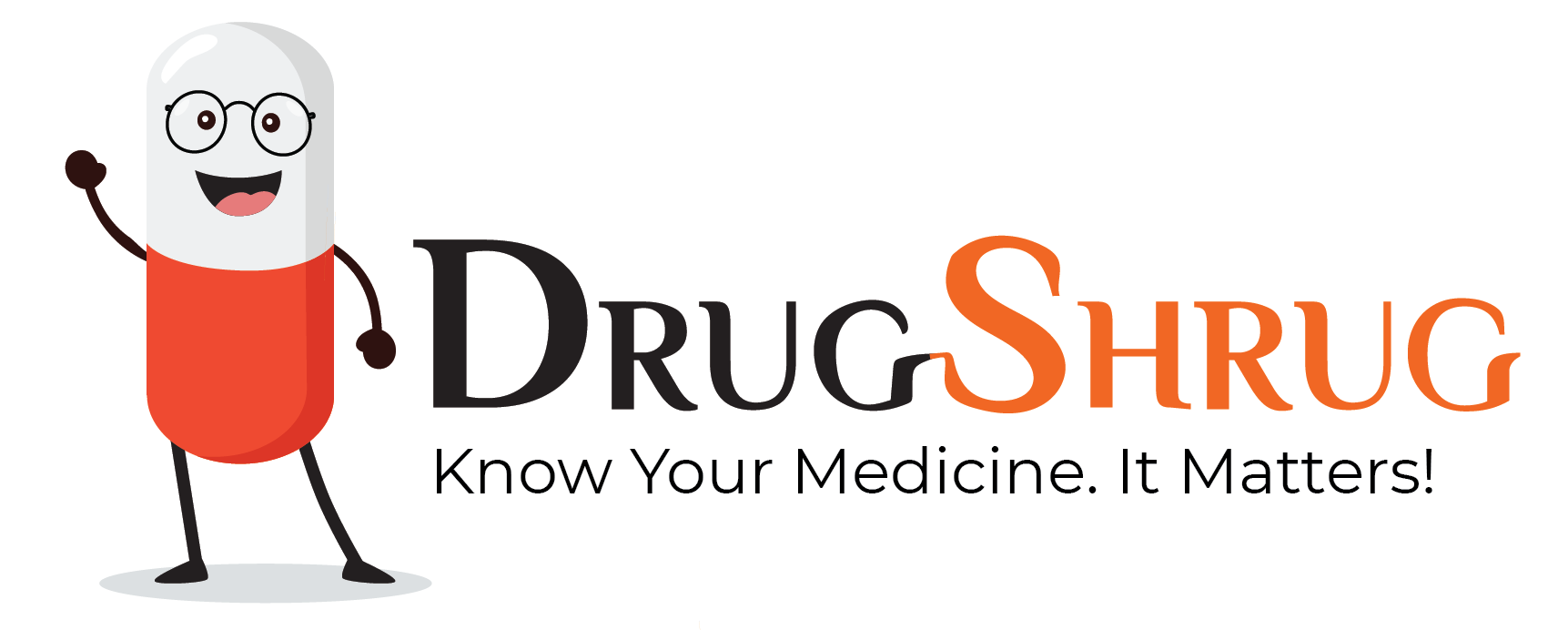What is Rabeprazole?
Rabeprazole is recommended to cure signs of gastro-oesophageal reflux disease (GERD) in adults and children above the age of 1 year. It is a short-term treatment also used to treat conditions with including undue stomach acid production like Zollinger-Ellison syndrome. It is also employed to heal duodenal ulcers or erosive esophagitis (debilitation of oesophagus triggered by stomach acid). Often used in combination with antibiotics to preclude duodenal cancer cased due to Helicobacter pylori infection. The medicine is never advised to treat heartburn symptoms. It may also be utilized for purposes not mentioned in this concise medication directory.
What are the common conditions in which Rabeprazole prescribed?
This medicine is used to treat the following conditions:
- Gastro-oesophageal disease (GERD)
- Excessive stomach acid production in conditions like Zollinger-Ellison syndrome
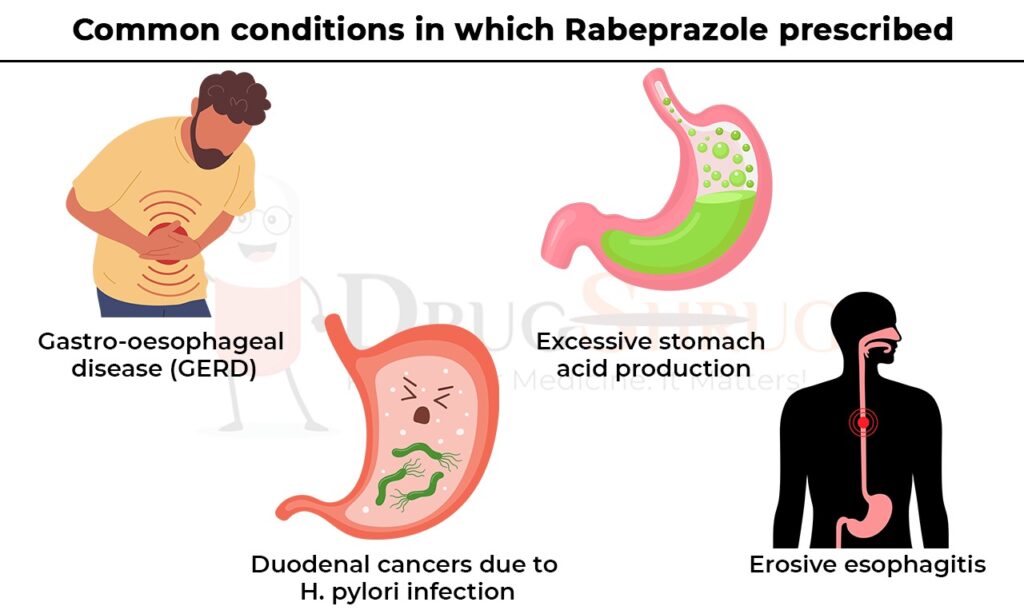
- Duodenal cancers due to H. pylori infection
- Erosive esophagitis
How should I take Rabeprazole?
This medicine is generally taken once in a day. Strictly adhere to the instructions on the prescription label and medication guide. Administer the drug as per the directions. The medicine is meant for short term uses only, typically 4-8 weeks.
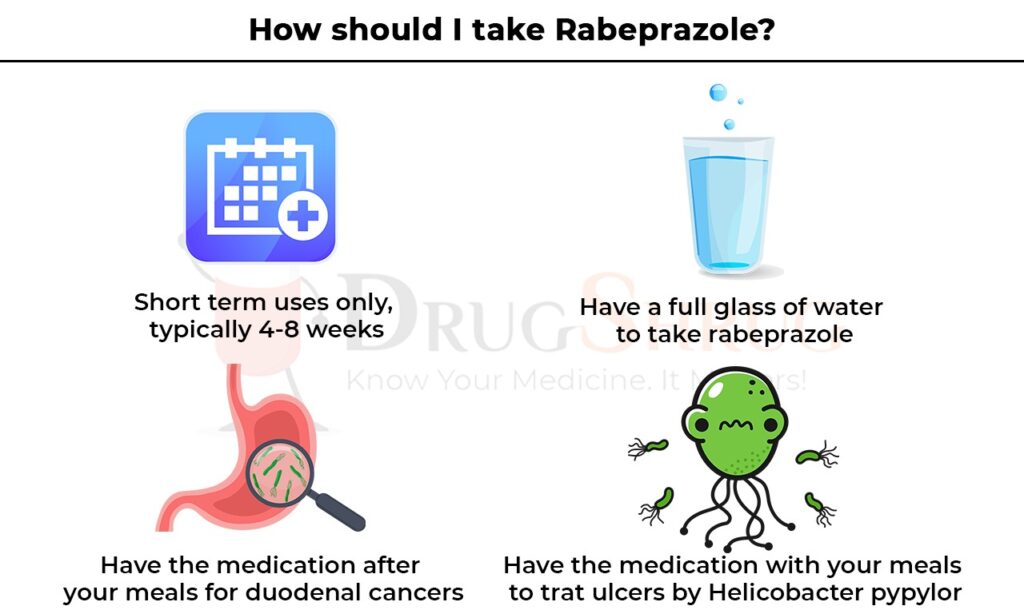
However, the doctor may propose a second treatment course, if additional time is needed for cure. Do not give AcipHex Sprinkle to children less than 1 year old. Have a full glass of water to take rabeprazole. In case you take this drug for treatment of duodenal cancers, use it after your meals. If you are taking for treating ulcers caused by Helicobacter pylori, take the medication with food. However, if you take it for other disorders, you are free to take it with or without food. Go through all the instructions on medicine label and if you do not get any, talk to your doctor. Do not crush, chew or crack the tablet, rather swallow it whole.
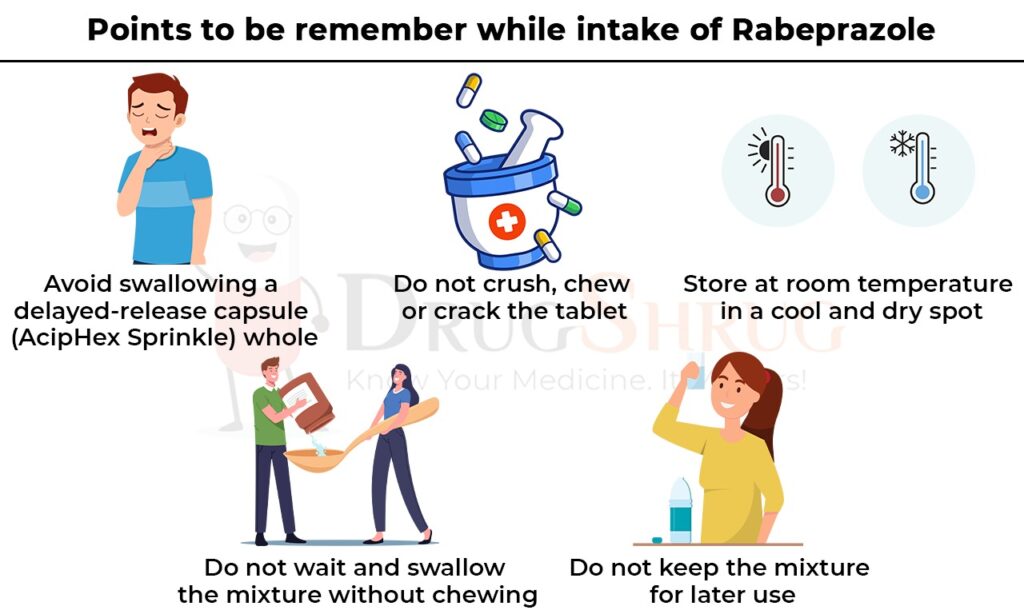
Avoid swallowing a delayed-release capsule (AcipHex Sprinkle) whole. You need to open and sprinkle the medicine onto a dollop of soft victual like yogurt, baby food prepared from fruit, Pedialyte or infant formula. Do not wait and swallow the mixture without chewing. Do not keep the mixture for later use. It may affect the results of some medical tests, therefore, inform your clinician about your administration of rabeprazole. There are particular conditions which are treated by using this drug in tandem with antibiotics. Use the medicine for prescribed duration even though you see your symptoms ameliorating. If the condition aggravates or do not improve as you use this medication, tell you doctor. Store at room temperature in a cool and dry spot.
When you should not take Rabeprazole?
This drug can trigger kidney problems. If you notice any symptoms like unusual urination or bloody urine, immediately tell your doctor. You may also get diarrhoea as a sign of new infection. If the diarrhoea is watery or bloody, get to your doctor at once. Long-term administration of this medicine, taking more than once in a day, can cause fragile and broken bones. If you experience chest pain that gradually permeates to your shoulder or jaw, and you feel dizzy or anxious, seek urgent medical attention.
Do not take this drug if you are allergic to it or notice the following:
- If you had breathing problems, kidney issues, or serious allergic response to this medicine
- If you take any drug containing rilpivirine (Endurant, Compera, Juluca, Odefsey)
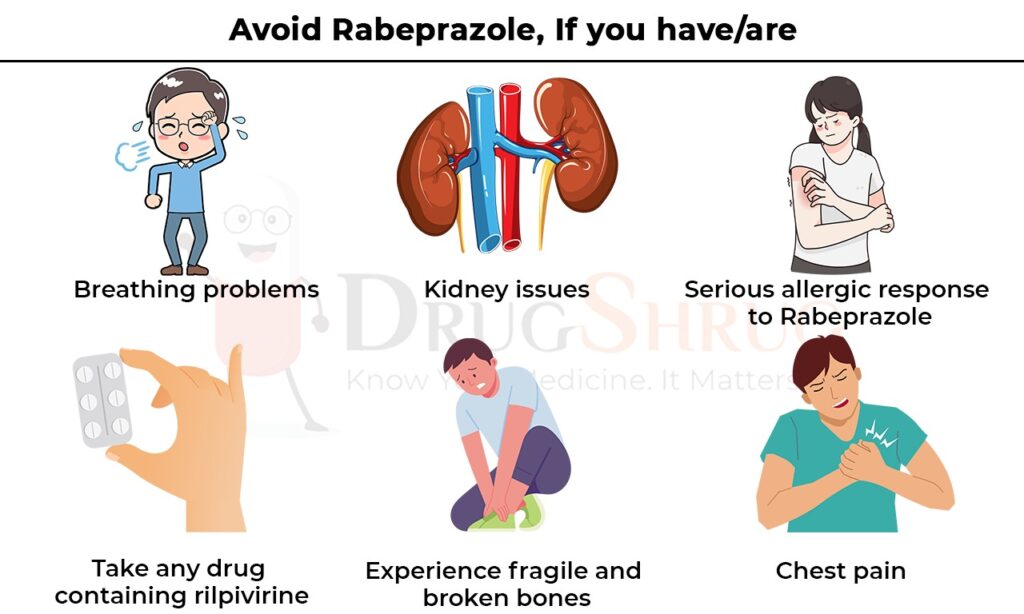
- In case you are allergic to medications such as rabeprazole, esomeprazole, lansoprazole, omeprazole, pantoprazole, Nexium, Prevacid, Prilosec and other medicines.
Apprize your doctor if you have ever faced the following:
- Osteoporosis, or osteopenia (low bone mineral density)
- Hepatic disease
- Lupus (an autoimmune disease)
- Meek magnesium levels in blood
You are likely to get broken bones in hip, wrist, or spine while you also use proton pump inhibitor for more than once in a day with endured use.
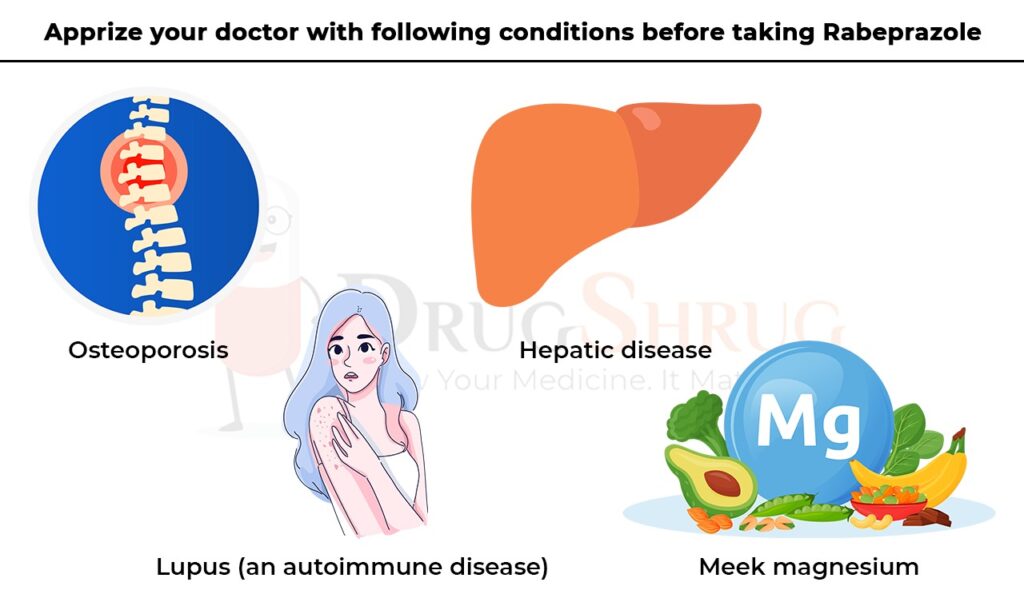
Ask for some measure to keep your bones sturdy from your doctor. Inform the doctor if you are nursing a baby, or you are pregnant. Avoid attempting this medicine on a child without your doctor’s consultation. Since, there are particular strengths and doses that should not be given to those less than 12 years of age.
What are the possible side effects of Rabeprazole?
If you experience symptoms of allergic response to the medication such as hives, shallow breath, inflammation in your face or throat, seek immediate medical attention.
Tell your immediately of you experience:
- Abrupt pain and discomfort in hip, back or wrist movements
- Serious stomach ache, bloating, bloody or watery diarrhoea
- Seizures
- Low magnesium: irregular or rapid heart rate, shakiness, jerky muscle movements, feeling anxious, muscle cramps and spasms in feet and hands cough or choking of throat
- Kidney issue: fever, appetite loss, joint pain, unusual urination, bloody urine, inflammation, fast weight gain, rashes on skin
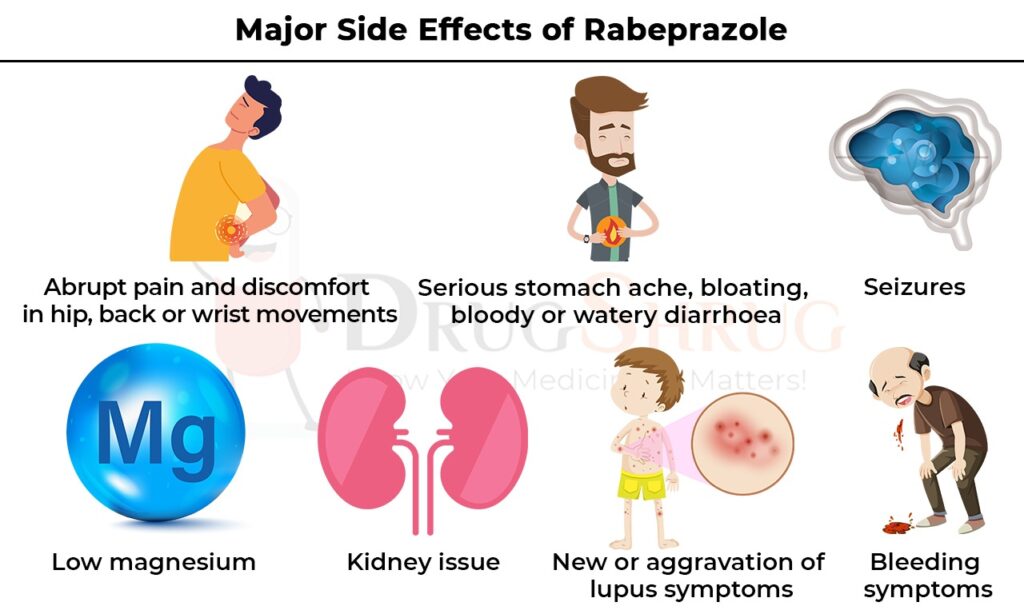
- New or aggravation of lupus symptoms: joint pain, skin rashes on arms or cheeks that exacerbate due to sunlight exposure
- Bleeding symptoms (in case you also administer warfarin): headaches, feeling dizzy, aches and swellings, unusual bleeding from nose, or gums), bloody cough, red or pinkish urine, hefty menstrual flow, bloody or tarry stools, vomit that seems like coffee grounds, or any other symptom of incessant bleeding.
Long-term usage of this drug can inflict fundic gland polyps, which is a malicious growth in the stomach. You need to interact about this risk to our clinician. Taking it for more than 3 years can cause vitamin B-12 deficiency. Ask your doctor about management measures in case you develop this issue.
Usual side effects may occur, which may consist of the following:
- Pain
- Infection
- Strep throat
- Headache,
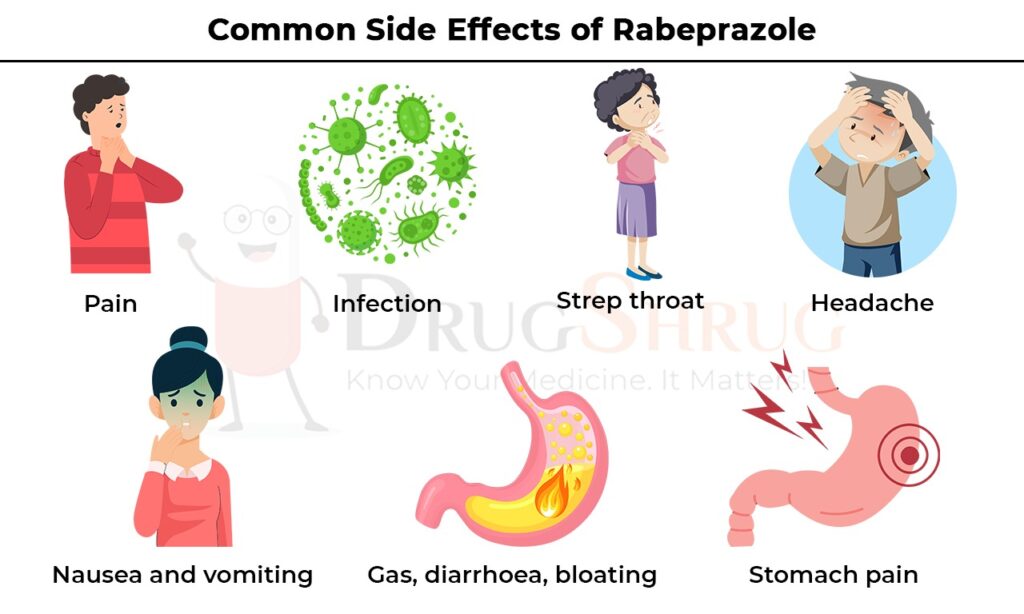
- Nausea and vomiting
- Gas, diarrhoea, bloating
- Stomach pain
If you face the problem of diarrhoea with watery or blood stools, do prefer to consult your doctor before taking any anti-diarrhoea medication.
However, these all are not the only possible side- effects, as it may show in other symptoms as well. Ask your doctor for clinical guidance about its side effects.
What to do if I miss the dose?
Try to take the medicine as soon as you can. However, if it is almost the time of your next dose, skip the missed one.
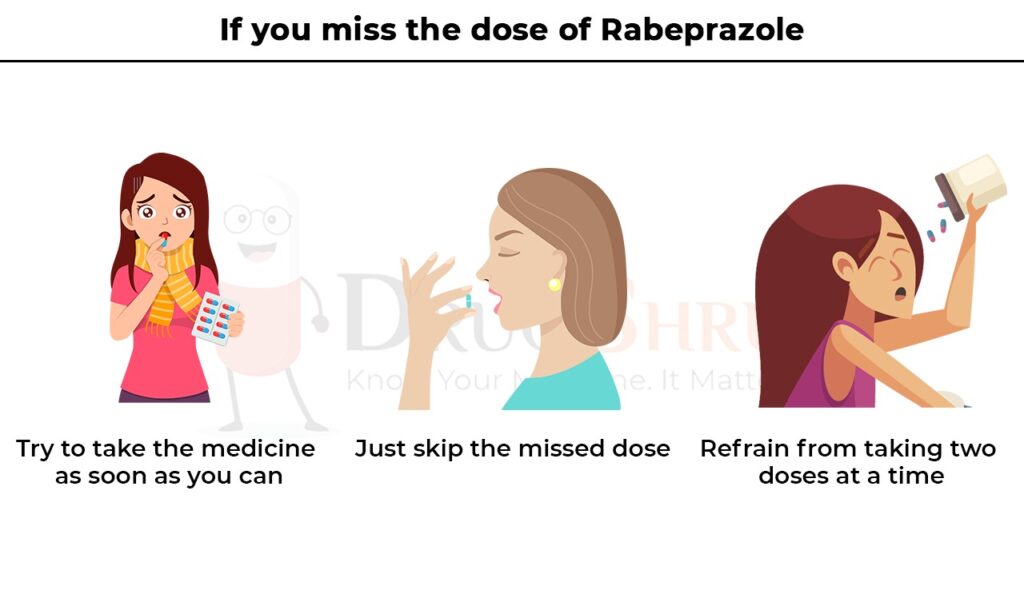
Avoid taking two doses at a time to compensate for the missed dosage.
Common Drug Interaction with Rabeprazole
Inform your doctor about all the medications you use at present, since many of them can interfere with rabeprazole.
Following drugs have the most likely interaction with this medicine:
- Digoxin
- Antibiotics such as clarithromycin and amoxicillin
- Diuretics or water pill
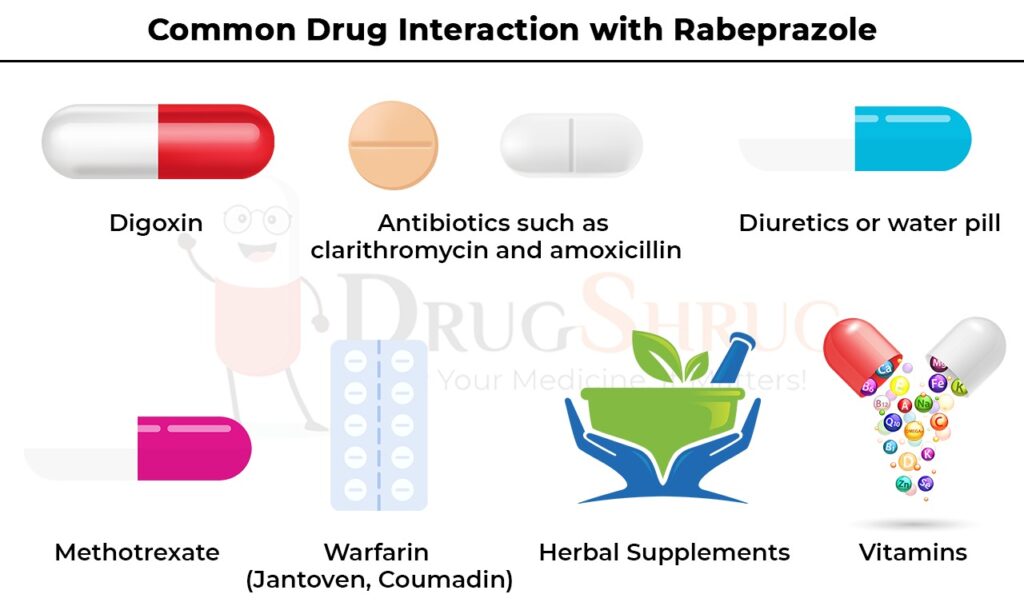
- Methotrexate
- Warfarin (Jantoven, Coumadin)
Other medications may interact with this medicine, including prescription and over-the-counter drugs, vitamins, and herbal supplements.
This is not the complete list of drug interactions.
Bottom Line
Rabeprazole is generally recommended treating duodenal cancers, GERD, erosive esophagitis and other related conditions. Being a strict prescriptive medicine, it should not be taken without doctor’s consultation. Strictly follow all the instructions while using this drug else serious consequences may ensue.
Further Reading:
